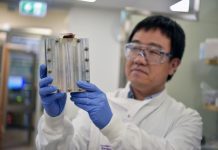
Swinburne University of Technology has secured two Australian Research Council (ARC) Linkage Project grants worth nearly $920,000 to advance research in battery energy storage and electric vehicle (EV) cybersecurity.
The funding forms part of the ARC’s National Competitive Grants Program, which supports projects aimed at delivering tangible benefits and enhancing Australia’s innovation and industry capabilities.
Led by Professor Weixiang Shen, one of the projects will focus on extending the lifespan of battery energy storage systems used in power grids, as revealed in a news release.
The research team will use digital twin technology to develop innovative control strategies that slow battery ageing at the individual cell level.
“This project will enable my team to develop an innovative control strategy to actively manage the operating conditions of an individual battery cell using digital twin technology,” Professor Shen said.
“It offers an excellent opportunity to implement and validate our approach in inverter-less battery energy storage systems provided by our industry partner, which uniquely enables cell-level control within the system.”
Professor Shen added that the research could strengthen Australia’s leadership in energy storage, support local manufacturing, and create high-skilled jobs.
The three-year project is being conducted in partnership with Relectrify Pty Ltd, with contributions from Associate Professor Rosalie Hocking, Dr Xiaohua Ge, Dr Peter Mahon, Dr Zhe Zhang, Mr Kristian James Guinto and Mr Bowen Zhang.
A second Swinburne-led project, headed by Professor Yang Xiang, has received $474,531 to develop cybersecurity tools for electric vehicle charging stations.
These tools aim to address vulnerabilities arising from the integration of charging stations with multiple EV types, the national power grid, and wireless communications.
“This grant will allow my team to build advanced cybersecurity tools that address the challenges posed by the interaction between EV charging stations, diverse EVs, the national power grid, and wireless communication protocols,” Professor Xiang said.
“It creates a unique opportunity to generate novel research insights, validate solutions in real-world settings, and produce tools with strong commercialisation potential.”
The project seeks to improve safety and resilience in EV charging infrastructure through the development of functionality-guided, update-guided, and greybox-guided fuzzing techniques.
t is being carried out in partnership with T-POWER Pty Ltd, and includes Associate Professor Sheng Wen, Dr Xiaogang Zhu and Dr Lihong Tang as team members.
Swinburne’s Deputy Vice Chancellor Research, Professor Karen Hapgood, said the university is proud to be at the forefront of research in two key areas of national importance.
“These projects demonstrate how our researchers are partnering with industry to deliver practical solutions, from extending the life of battery systems to securing Australia’s electric vehicle infrastructure,” Professor Hapgood said.
“It’s a powerful example of how university research is driving innovation and supporting a more sustainable, technologically advanced future.”
The projects are among 75 nationwide to receive a share of more than $46 million under the ARC’s latest round of Linkage Projects.




















